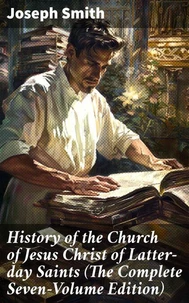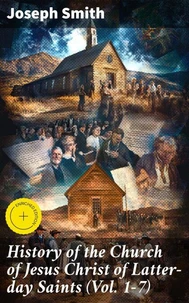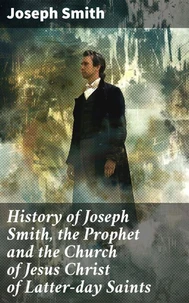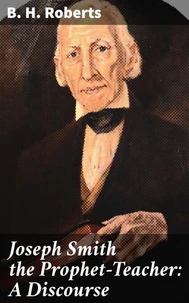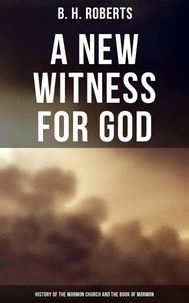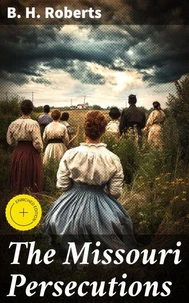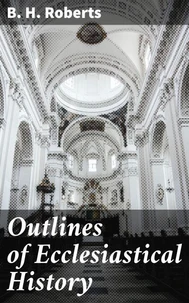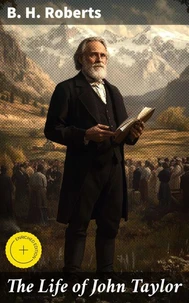The Seventy's Course in Theology (First Year). Outline History of the Seventy and A Survey of the Books of Holy Scripture
Par :Formats :
Disponible dans votre compte client Decitre ou Furet du Nord dès validation de votre commande. Le format ePub est :
- Compatible avec une lecture sur My Vivlio (smartphone, tablette, ordinateur)
- Compatible avec une lecture sur liseuses Vivlio
- Pour les liseuses autres que Vivlio, vous devez utiliser le logiciel Adobe Digital Edition. Non compatible avec la lecture sur les liseuses Kindle, Remarkable et Sony
 , qui est-ce ?
, qui est-ce ?Notre partenaire de plateforme de lecture numérique où vous retrouverez l'ensemble de vos ebooks gratuitement
Pour en savoir plus sur nos ebooks, consultez notre aide en ligne ici
- Nombre de pages302
- FormatePub
- ISBN4057664152138
- EAN4057664152138
- Date de parution19/11/2019
- Protection num.Digital Watermarking
- Taille795 Ko
- Infos supplémentairesepub
- ÉditeurGOOD PRESS
Résumé
In "The Seventy's Course in Theology (First Year), " B. H. Roberts meticulously constructs an educational framework for understanding Latter-day Saint theology, utilizing an expository literary style that is both accessible and authoritative. Through a systematic examination of foundational principles, doctrines, and historical contexts, Roberts engages the reader with a blend of scholarly rigor and spiritual insight, aimed particularly at preparing members of the Seventy'Äîan important leadership body within the Church of Jesus Christ of Latter-day Saints.
The book is infused with doctrinal teachings, scriptural references, and ecclesiastical history, making it a pivotal text for theological education within the LDS tradition during a time of significant ecclesiastical expansion and doctrinal consolidation in the early 20th century. As a prominent church leader, historian, and theologian, B. H. Roberts was deeply influenced by his commitment to the principles of the Latter-day Saint faith and his belief in the importance of sound instruction.
His multifaceted role as a member of the Quorum of the Seventy, along with his scholarly pursuits in history and doctrine, inspired him to compile this comprehensive course, aiming to equip church leaders with a robust understanding of their faith and responsibilities. Roberts's work is an essential read for anyone interested in Latter-day Saint theology, church governance, or religious education.
Its depth and clarity make it a valuable resource for church leaders, educators, and laypeople alike, providing insights that resonate far beyond its original context and continue to inform contemporary discussions in religious circles.
The book is infused with doctrinal teachings, scriptural references, and ecclesiastical history, making it a pivotal text for theological education within the LDS tradition during a time of significant ecclesiastical expansion and doctrinal consolidation in the early 20th century. As a prominent church leader, historian, and theologian, B. H. Roberts was deeply influenced by his commitment to the principles of the Latter-day Saint faith and his belief in the importance of sound instruction.
His multifaceted role as a member of the Quorum of the Seventy, along with his scholarly pursuits in history and doctrine, inspired him to compile this comprehensive course, aiming to equip church leaders with a robust understanding of their faith and responsibilities. Roberts's work is an essential read for anyone interested in Latter-day Saint theology, church governance, or religious education.
Its depth and clarity make it a valuable resource for church leaders, educators, and laypeople alike, providing insights that resonate far beyond its original context and continue to inform contemporary discussions in religious circles.
In "The Seventy's Course in Theology (First Year), " B. H. Roberts meticulously constructs an educational framework for understanding Latter-day Saint theology, utilizing an expository literary style that is both accessible and authoritative. Through a systematic examination of foundational principles, doctrines, and historical contexts, Roberts engages the reader with a blend of scholarly rigor and spiritual insight, aimed particularly at preparing members of the Seventy'Äîan important leadership body within the Church of Jesus Christ of Latter-day Saints.
The book is infused with doctrinal teachings, scriptural references, and ecclesiastical history, making it a pivotal text for theological education within the LDS tradition during a time of significant ecclesiastical expansion and doctrinal consolidation in the early 20th century. As a prominent church leader, historian, and theologian, B. H. Roberts was deeply influenced by his commitment to the principles of the Latter-day Saint faith and his belief in the importance of sound instruction.
His multifaceted role as a member of the Quorum of the Seventy, along with his scholarly pursuits in history and doctrine, inspired him to compile this comprehensive course, aiming to equip church leaders with a robust understanding of their faith and responsibilities. Roberts's work is an essential read for anyone interested in Latter-day Saint theology, church governance, or religious education.
Its depth and clarity make it a valuable resource for church leaders, educators, and laypeople alike, providing insights that resonate far beyond its original context and continue to inform contemporary discussions in religious circles.
The book is infused with doctrinal teachings, scriptural references, and ecclesiastical history, making it a pivotal text for theological education within the LDS tradition during a time of significant ecclesiastical expansion and doctrinal consolidation in the early 20th century. As a prominent church leader, historian, and theologian, B. H. Roberts was deeply influenced by his commitment to the principles of the Latter-day Saint faith and his belief in the importance of sound instruction.
His multifaceted role as a member of the Quorum of the Seventy, along with his scholarly pursuits in history and doctrine, inspired him to compile this comprehensive course, aiming to equip church leaders with a robust understanding of their faith and responsibilities. Roberts's work is an essential read for anyone interested in Latter-day Saint theology, church governance, or religious education.
Its depth and clarity make it a valuable resource for church leaders, educators, and laypeople alike, providing insights that resonate far beyond its original context and continue to inform contemporary discussions in religious circles.


